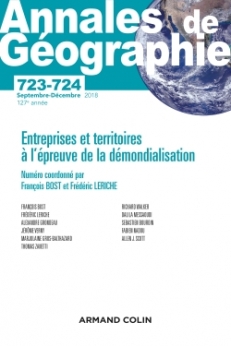
Annales de géographie - n°723/724 (5-6/2018)
Pour acheter ce numéro, contactez-nous
Recevez les numéros de l'année en cours et accédez à l'intégralité des articles en ligne.
L’article vise à réfléchir aux logiques articulant, d’une part, la division du travail sous diverses formes et, d’autre part, la mondialisation et ses dynamiques spatiales. Il commence en retraçant la généalogie du concept de division du travail dans l’histoire de l’économie politique classique. Les différentes déclinaisons fonctionnelles de la division du travail sont ensuite analysées, afin de construire une théorie générale de l’organisation de la production économique. Sur cette base, l’attention porte alors sur la dimension géographique de la question. L’articulation entre la division du travail et les forces centripètes de l’agglomération industrielle, puis la manière dont la division du travail se traduit à différents échelons géographiques (y compris mondial) sont ainsi analysées.
The paper seeks to examine the logic relating the division of labor to globalization and its spatial dynamics. It begins by studying the genealogy of the concept of division of labor within the tradition of classical political economy. Different functional variations of the division of labor are analyzed in order to construct a general theory of the organization of economic production. Attention is then paid to the geographic dimensions of this issue. The relation between the division of labor and the centripetal forces of industrial agglomeration and the way the division of labor takes shape at different spatial scales (including the global) are analyzed.

